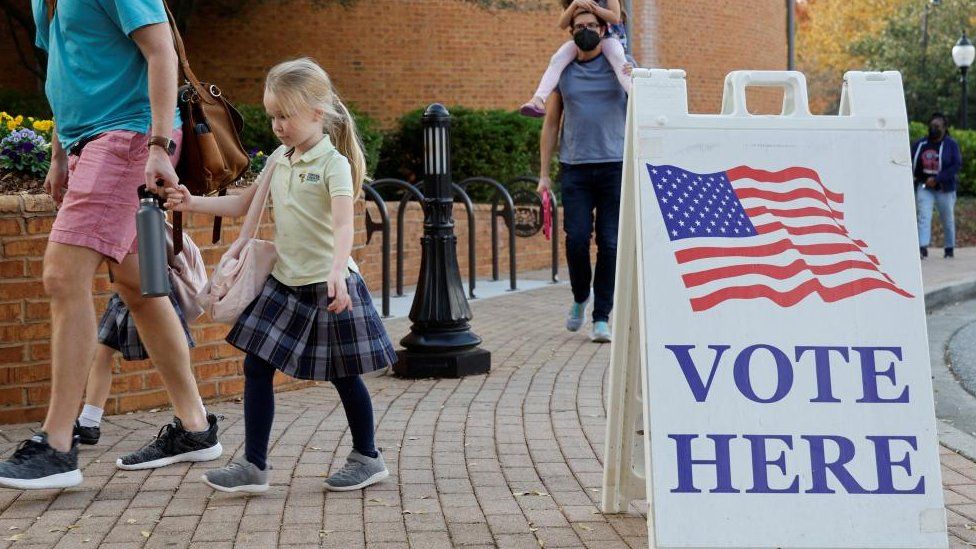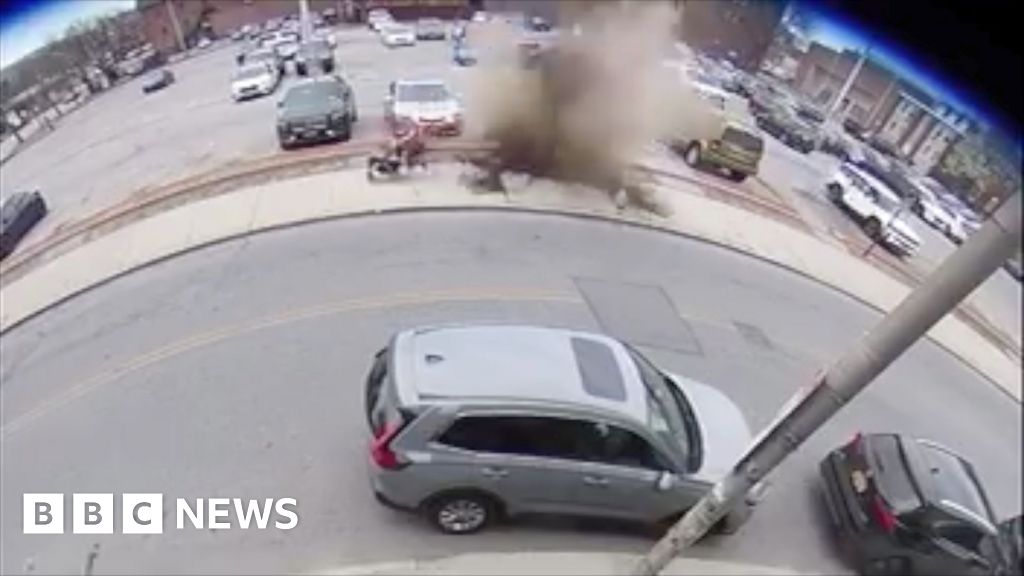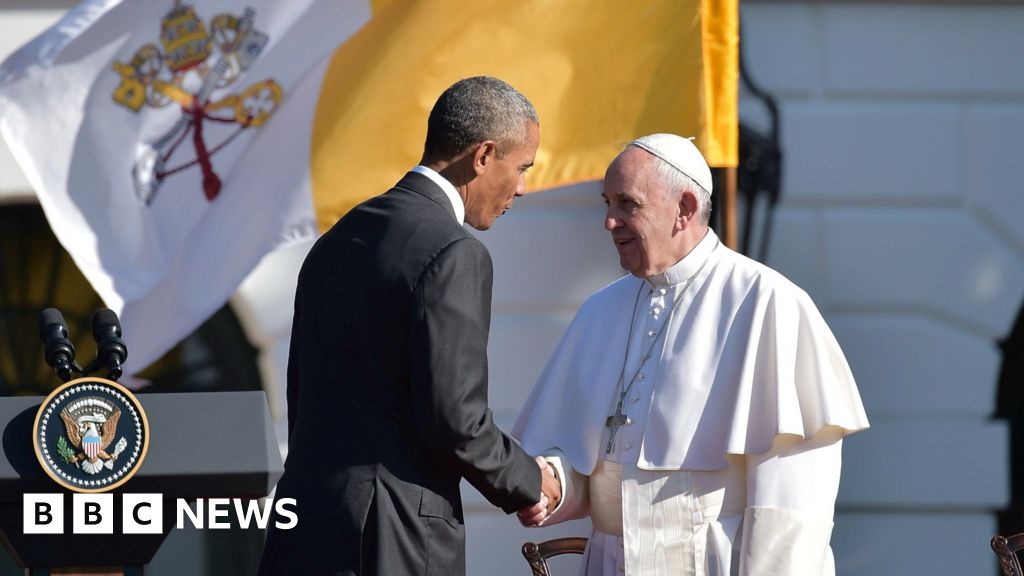ARTICLE AD BOX
 Image source, Getty Images
Image source, Getty Images
It may take days or weeks to know the final results of the midterms in states including Georgia.
By Bernd Debusmann Jr
BBC News, Washington
As voters across the US wake up on Wednesday morning after the election, the results of the 2020 midterms are unlikely to be completely clear - with officials across the country warning that elections may drag on for days or weeks.
The expected delays are the result of a number of factors, including razor-thin margins between candidates, potentially contested elections and the possibility of recounts.
Other delays will be due to the decentralised way in which elections are set up in the US, in which states have varied rules for how mail-in ballots are counted, and when.
The issue of delays has been a politically contentious one since the 2020 presidential election, when then-President Donald Trump attempted to claim victory the following morning while votes were still being tallied, declaring continued voting counting a "fraud" and an "embarrassment".
"We want all voting to stop," Mr Trump said early on the morning of 4 November, less than an hour after the last polls closed in Alaska. "We don't want them to find any ballots at four o'clock in the morning and add them to the list."
The controversy has prompted electoral officials across the country to warn in recent days that delays are a normal, expected part of US elections.
In a speech on 2 November, US President Joe Biden also weighed-in, warning that "it's important for citizens to be patient" while ballots are counted "in a legal and orderly manner".
Let's take a look at why certified results are likely to trickle in slowly.
Early Voting
Although the final numbers are not yet in, the number of people who cast their ballots ahead of the 8 November election has already surpassed the total from the 2018 midterms. This is likely to be the most significant factor when it comes to delays this electoral cycle.
As of Monday, more than 40 million early votes - including in-person and mail-in ballots - had been cast, compared to 39.1 million in 2018.
Different states have varied regulation for how mail-in ballots are processed.
- Follow the BBC's coverage of the US midterm elections here.
Pennsylvania, for example, is one of eight states that only allowed election officials to begin processing ballots on election day. In Maryland, on the other hand, state regulations stipulate that the processing of ballots cannot begin until 10:00 local time on the morning after the election.
Similarly, 16 states and Washington DC do not allow counting to begin until the polls close on election day, while 23 states allow counting to begin earlier on the same day. Only 10 states allow ballots to be processed and counted ahead of time before 8 November.
Nineteen states also have a grace period that allows ballots to be counted afterwards, provided that they were sent through the mail by election day. In California, for example, ballots can still be received for another full week. In Arizona, on the other hand, ballots must be in by election day, although officials have 20 days to come to a final count.
Recounts and Run-offs
Delays could also be caused by recounts, which can take place in races with extremely narrow margins of victory, or, in many states, when requested by one of the participating candidates. While the process varies slightly by state, 41 states and Washington DC allow for recounts to be requested. Twenty-two states have provision for automatic recounts.
In Georgia - where there is a tight race between Democratic Senator Raphael Warnock and Republican Herschel Walker - winning candidates must receive at least 50% of the vote.
If neither candidate reaches that number on election night, a run-off election will be held on 6 December, a replay of the 2020 election in the state.
Image source, Getty Images
Image caption,Arizona Secretary of State Katie Hobbs has warned that a quick election result is "not going to happen".
Where can we expect delays?
There are a number of states in which election watchers have said they expected delays, including several that are home to key senate races.
In Pennsylvania, a law passed by the Republican-controlled state legislature means that mail-in ballots cannot be counted until the day after the election. Additionally, the state's top court recently ruled that mail-in ballots marked with the wrong date will not be counted, although officials have been ordered to "segregate and preserve" any ballots that were mailed in undated or incorrectly dated envelopes in case of further legal challenges.
The ruling is already the subject of a legal challenge from civil rights groups, which argue that a refusal to count ballots due to "trivial" paperwork issues has a "suppressive effect" on voters and could disenfranchise thousands. The lawsuit seeks to bar state and local governments from certifying any election in which all ballots have not been taken into account.
All this could mean that it might take days to know the results of two of the most closely watched races in the midterms: the race for governor between Democrat Josh Shapiro and Republican Doug Mastriano, and the Senate race between celebrity doctor Mehmet Oz and Lieutenant Governor John Fetterman. The latter race could ultimately determine which party controls the Senate.
Leigh Chapman, Pennsylvania's acting secretary of state. has already warned that results are unlikely to come immediately.
"It's really important for us to get accurate information about the election process in Pennsylvania," Ms Chapman said at a news conference in late October. "So voters and the public know that when there are delays in counting, it doesn't mean that there's anything nefarious happening. It's just what the law is in Pennsylvania."
Across the country in Arizona - where a large majority of people opt to vote by mail - officials have warned that the counting process may take up to 12 days. Voters in the state also have five days to correct their signature if requested by officials.
"As much as we all want to see the winner on election night in those close races, that's just not going to happen," Secretary of State Katie Hobbs said in October. "These things take time."

 2 years ago
57
2 years ago
57








 English (US) ·
English (US) ·